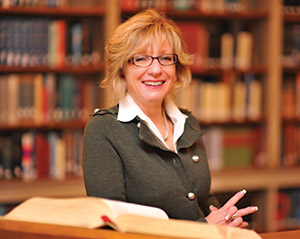 “In a time of fast-paced change,” notes the Rev. Dr. Susan Kendall, “it’s important to be attuned to the concerns and hopes of those in ministry.” But Susan, who directs the Seminary’s Doctor of Ministry Program, isn’t sure we’ve learned how change affects us—or, for that matter, the necessity of change. “We want to rest in our personal and institutional narratives, much like a toddler enjoying being pushed around in the park by adults. But that is neither possible nor age appropriate!” she observes.
“In a time of fast-paced change,” notes the Rev. Dr. Susan Kendall, “it’s important to be attuned to the concerns and hopes of those in ministry.” But Susan, who directs the Seminary’s Doctor of Ministry Program, isn’t sure we’ve learned how change affects us—or, for that matter, the necessity of change. “We want to rest in our personal and institutional narratives, much like a toddler enjoying being pushed around in the park by adults. But that is neither possible nor age appropriate!” she observes.
Recognizing the constancy of change, Susan has developed three new foci in the D.Min. program: Missional Leadership, Urban Change, and a new collaboration with the School of Divinity at the University of Edinburgh (Scotland)—a collaboration to address contemporary themes within Reformed theology. Why these three areas?
Susan answers by explaining, “In our clearly post-denominational age, defining spirituality and spiritual formation and practice is no longer the purview of churches and institutions. To be effective ministers of the gospel, pastors and Christian leaders need to understand why this change has occurred, so that they can then determine how to engage in new dialogue and meet people where and as they are.” She elaborates, “The new foci create a space for those in ministry to discover together the continuing movement of the Spirit, of God at work in the world, and how best to participate in it.”
For example, the Urban Change focus (which begins in January 2015) takes seriously the global impact of a world in which nearly 75 percent of the population will soon be living in urban areas. “Students applying for this focus are tough minded and keenly aware of the violence, poverty, and lack of opportunity for much of the world,” Susan says. Similarly, the Missional Leadership focus responds to the growing number of non-traditional ministries whose leaders work with largely non-church-going populations, and the new Reformed theology focus contextualizes historic tradition for modern-day ministers of the gospel. Both cohorts begin in June 2015.
“I am often asked, ‘Why do a D.Min.?’” says Susan. Her answer demonstrates the strengths of the program she has developed at Pittsburgh Seminary: “Here it’s a cutting-edge degree in a rapidly changing world. It not only offers intellectual depth and theological reflection, but it also uses those necessary ways of learning to form practices, shape habits, and reconfigure the purposes of institutions, traditions, and settled patterns. After all,” she notes, “the biblical narrative is primarily about change—about risk and trust, about seeing failure always as a new beginning. Authentic faith takes us to the edge, where change calls us forward. And all too often we opt for an easy ride.”
In that forwarding-oriented spirit, Susan is already working toward future D.Min. foci—one designed for alums of the Miller Summer Youth Institute, and another on the themes of gender, power, and the pulpit. The latter will address narratives of and for women in an age of continuing challenge for them as more than half the world’s population.
Learn more about these upcoming foci online or contact Susan at 412-924-1421 or .
